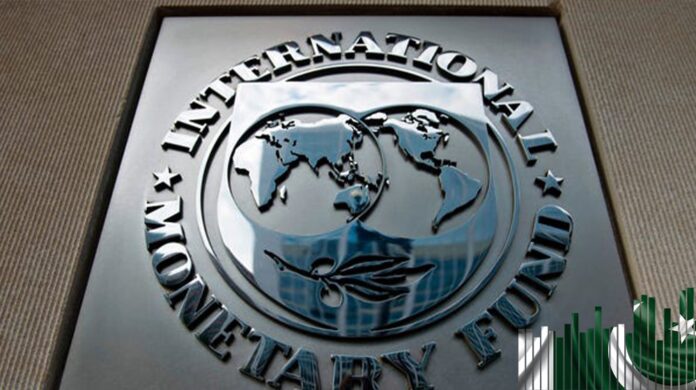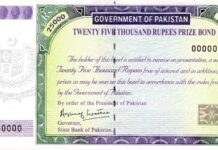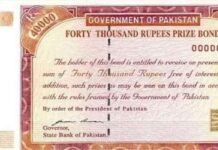آئی ایم ایف نے کمرشل بینکوں میں سرکاری ڈپازٹس کو اسٹیٹ بینک کو منتقل کرنے کی تجویز پیش کی
The International Monetary Fund (IMF) has reportedly proposed transferring government reserves in commercial banks to federal consolidated funds in the central bank.
According to the report, the International Monetary Fund has shared a draft proposal in which the reserves of the federal and provincial governments held by the government in the three major commercial banks are transferred to the Federal Consolidated Funds under the Treasury Single Account TSA 1 at the State Bank of Pakistan. Has been asked to
The Pakistani government and the International Monetary Fund (IMF) are currently resolving differences over the pace of adjustment on fiscal, monetary and exchange rates. The IMF wants to make immediate adjustments, while the Pakistani government wants to implement periodic changes.
The banks under discussion are National Bank of Pakistan, Bank of Punjab, and Askari Bank Limited, which have the largest share of deposits till June 30.
The policy aims to create a unified structure of public bank accounts, which will provide a solid idea of government cash resources. The finance ministry wants to transfer deposits to the central bank to gain effective control over its cash balance. As a result, resources will be pooled in a single account, which is expected to reduce government borrowing costs.
The move is also expected to help the government reduce the number of its accounts, which will help reduce administrative and maintenance costs.
However, deposit attraction will lead to more advance in deposit ratio for banks. It is estimated that banks will lose a 2% spread between interest rates on money markets and interest payments on deposits. In addition, overnight lending by commercial banks will also reduce additional repayments, as banks will need to transfer money to the central bank at the end of the day.
As of June 30, the National Bank of Pakistan (NBP) had kept Rs. Out of total bank deposits, Rs 674.985 billion. 2.418 trillion, the majority of government reserves. Meanwhile, the Bank of Punjab had kept deposits of Rs. Out of its total reserves, Rs. 409.081 billion. 835.070 billion. Askari Bank Limited (AKBL) has government reserves of Rs. Out of its total reserves, Rs. 257.515 billion. 790.982 billion.
Pakistani officials and the IMF are currently negotiating conditions for approving the next tranche of a 1 1 billion loan under the fund’s 6 6 billion program. The talks began in early October and no date has been set for their end.
بین الاقوامی مالیاتی فنڈ نے مبینہ طور پر کمرشل بینکوں میں حکومتی ذخائر کو مرکزی بینک میں فیڈرل کنسولیڈیٹڈ فنڈز میں منتقل کرنے کی تجویز پیش کی ہے۔
رپورٹ کے مطابق، بین الاقوامی مالیاتی ادارے نے ایک مسودہ تجویز کا اشتراک کیا ہے جس میں حکومت سے تین بڑے کمرشل بینکوں کے پاس موجود وفاقی اور صوبائی حکومتوں کے ذخائر اسٹیٹ بینک آف پاکستان میں ٹریژری سنگل اکاؤنٹ 1 کے تحت وفاقی کنسولیڈیٹڈ فنڈز میں منتقل کرنے کا کہا گیا ہے۔
پاکستانی حکومت اور بین الاقوامی مالیاتی فنڈ (آئی ایم ایف) اس وقت مالیاتی، مالیاتی اور شرح مبادلہ کے معاملات پر ایڈجسٹمنٹ کی رفتار کے حوالے سے اختلافات کو دور کر رہے ہیں۔ آئی ایم ایف فوری طور پر ایڈجسٹمنٹ کرنا چاہتا ہے، جبکہ پاکستانی حکومت وقفوں میں تبدیلیاں نافذ کرنا چاہتی ہے۔
زیر بحث بینک نیشنل بینک آف پاکستان، بینک آف پنجاب، اور عسکری بینک لمیٹڈ ہیں، جن کے پاس 30 جون تک ڈپازٹس کا سب سے بڑا حصہ ہے۔
اس پالیسی کا مقصد سرکاری بینک کھاتوں کا ایک متحد ڈھانچہ تشکیل دینا ہے، جس سے حکومتی نقدی وسائل کو ایک مستحکم نظریہ حاصل ہو سکے گا۔ وزارت خزانہ اپنے نقد بیلنس پر موثر کنٹرول حاصل کرنے کے لیے ڈپازٹس کو مرکزی بینک میں منتقل کرنا چاہتی ہے۔ اس کے نتیجے میں ایک ہی اکاؤنٹ میں وسائل کو اکٹھا کیا جائے گا جس کے نتیجے میں، حکومت کی قرض لینے کی لاگت کو کم کرنے کی توقع ہے۔
اس اقدام سے حکومت کو اپنے اکاؤنٹس کی تعداد کو کم کرنے میں مدد کی بھی توقع ہے، جس سے انتظامی اور دیکھ بھال کے اخراجات کو کم کرنے میں مدد ملے گی۔
تاہم، ڈپازٹ اٹریشن بینکوں کے لیے ڈپازٹ ریشو میں زیادہ پیشگی کا باعث بنے گا۔ یہ اندازہ لگایا گیا ہے کہ بینک منی مارکیٹوں کی سود کی پیداوار اور ڈپازٹس پر ادا کیے جانے والے سود کے اخراجات کے درمیان 2 فیصد پھیلاؤ سے محروم ہوجائیں گے۔ اس کے علاوہ، کمرشل بینکوں کی جانب سے راتوں رات قرض دینے سے اضافی واپسی میں بھی کمی کی جائے گی، کیونکہ بینکوں کو دن کے اختتام پر رقم مرکزی بینک کو منتقل کرنے کی ضرورت ہوگی۔
30 جون تک، نیشنل بینک آف پاکستان نے روپے رکھے تھے۔ کل بینک ڈپازٹس میں سے 674.985 بلین روپے۔ 2.418 ٹریلین، حکومتی ذخائر کا اکثریتی حصہ۔ دریں اثنا، بینک آف پنجاب نے حکومتوں کے پاس روپے کے ڈپازٹس رکھے تھے۔ اس کے کل ذخائر میں سے 409.081 بلین روپے۔ 835.070 بلین۔ عسکری بینک لمیٹڈ کے پاس حکومت کے ذخائر روپے ہیں۔ اس کے کل ذخائر میں سے 257.515 بلین روپے۔ 790.982 بلین۔
پاکستانی حکام اور آئی ایم ایف اس وقت فنڈ کے 6 بلین ڈالر پروگرام کے تحت 1 بلین ڈالر کے قرض کی اگلی قسط کی منظوری کے لیے شرائط پر بات چیت کر رہے ہیں۔ یہ بات چیت اکتوبر کے آغاز میں شروع ہوئی تھی اور ابھی تک ان کے اختتام کے لیے کسی مقررہ تاریخ کا اعلان نہیں کیا گیا ہے۔
















